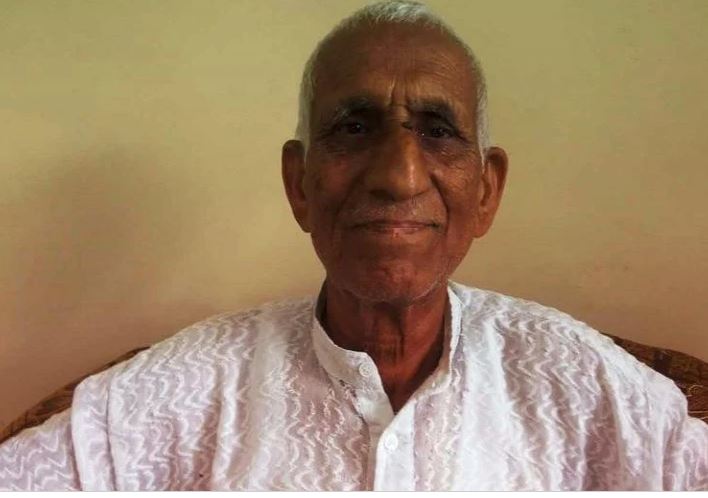By Nandita Haksar
To his last, he stood for principles and organised unions that brought communities together.
Sampat Prakash died on July 1, a few days after his 84th birthday. The obituaries in Kashmiri papers describe him as a Kashmiri Pandit, a veteran trade union leader whose recent interviews “created a political storm in the region”. They were referring to a series of interviews Sampat Prakash gave on the most controversial subjects—the film The Kashmir Files, the killing of Kashmiri Pandits during the insurgency and the more recent killing of migrants in the Valley, and his views on the repeal of the special status of Jammu and Kashmir.
The strength of Sampat Prakash was that he was firmly rooted in the Kashmiri Pandit society; he could speak as a Kashmiri Pandit and yet speak for all Kashmiris as a political leader from the Valley. He saw the suffering of the Kashmiri Pandits as a larger part of the suffering of all Kashmiris.
Sampat Prakash was a powerful voice against identity politics, although he would not have described his political understanding in these words. He described himself as a “humble student of Marx and Lenin” and a communist until his last.
What made him a powerful and popular voice was he combined his Marxist understanding with his commitment to the idea of Kashmiriyat. He became aware of the limitations of this concept historically, but for him, it encapsulated the opposite of identity politics. He was deeply committed to the idea of Kashmiri nationalism and proud of Kashmir’s history, culture and language. At the same time, he fought political Islam.
The low-paid government employees organised under his leadership carried out demonstrations in which they would shout, ‘Trade Union ki Kya Buniyad—Marxvaad, Leninvaad, Red Flag Up, Up’. During the 1967 strike, he was wanted by the police and on one occasion, he addressed a meeting and slipped away in a taxi. When the police came too close, he jumped into the icy waters of the Jhelum and swam away. Finally, he was arrested and placed in solitary jail in Jammu, and from there, he made a dramatic escape.
From 1967 to this day, even during the insurgency when he had to leave his beloved Kashmir valley, he never stopped working for the people of Jammu and Kashmir.
The trade union movement substantially improved the working conditions of thousands of the poorest Kashmiris, whether the young men who stood in the rain and snow with their mules to take tourists up the mountains or the gardeners of the famous Mughal Gardens or the transport workers or the safai karamcharis in Jammu. Under his leadership, the trade union movement was militant but never violent; it took up the cause of Kashmiris but remained staunchly secular.
In an interview with WorkersUnity Live, he described the contribution of the trade union movement.
Sampat Prakash did not agree with the political objectives of the Kashmir insurgency, but he did not agree with the Indian State policy, which sought to beat the Kashmiri Muslims into silence through fear and humiliation. He condemned the triumphalism and bigotry of his community and spoke out against the Panun Kashmir movement, though its founder was his son’s father-in-law.
I met Sampat Prakash in 2002 when I was leading the campaign for the acquittal of SAR Geelani, the Kashmiri lecturer at Delhi University, framed in the Parliament attack case. The primary evidence against the lecturer was the tape of a conversation between Geelani in Delhi and his younger brother speaking from Kashmir, asking for the syllabus of some course. I had taken the tape to half-a-dozen Kashmiri Pandits, and all had clearly said there was nothing in the conversation to implicate him in the attack. But none would come to the court as expert witnesses. Then, I contacted Balraj Puri (1928-2014) in Jammu, and he sent Sampat Prakash. That is how we met.
It was mainly because of Sampat Prakash’s testimony that Geelani was ultimately acquitted. It is a testimony he gave despite knowing that Geelani came from a Jamaat-e-Islami background, an organisation whose ideology he had campaigned against. But this was a question of saving a fellow Kashmiri from the gallows.
It was one of my rewarding experiences to travel across Kashmir and interview the trade union leaders who had all bravely resisted the militants and stood against the human rights violations by Indian security forces. It was my privilege to record the history of the trade union movement and the life of Sampat Prakash and publish it in a book, The Many Faces of Kashmiri Nationalism: From the Cold War to the Present Day (2015, reprint 2020). It was a history of communists and communism in Jammu and Kashmir, a forgotten history that needs to be looked at more deeply.
Sampat Prakash never gave up. After retirement, he organised a senior citizens’ union. Just a few weeks ago, he invited me to the inauguration of another trade union—of unorganised and unemployed youth—he had organised. Twice, he had to postpone the event, first because of the G-20 Summit and then because he did not get permission on the ground that the Amarnath Yatra was to begin.
For Sampat Prakash, the trade union movement was another expression of Kashmiriyat. After all, it brought all communities together on one platform for a common programme.
Courtesy: Newsclick.in
The author is a human rights lawyer, teacher, campaigner, and writer.
